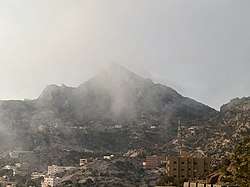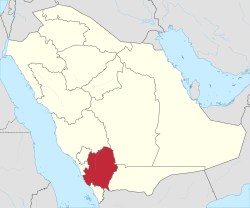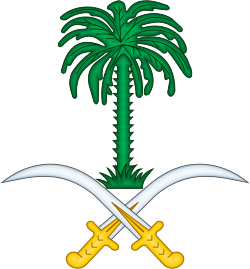'Asir Region
The ʻAsīr Region(Arabic: عَسِيرٌ, lit. 'Difficult' ʻAsīr) is a region of Saudi Arabia located in the southwest of the country that is named after the ʿAsīr tribe. It has an area of 76,693 square kilometres (29,611 sq mi) and an estimated population of 2,211,875 (2017).[1] It shares a short border with the Saada Governorate of Yemen.
ʻAsīr عَسِيرٌ | |
|---|---|
| ʻAsir Region | |
 | |
 Map of Saudi Arabia with ʻAsīr highlighted | |
| Country | Saudi Arabia |
| Capital | Abha |
| Boroughs | 13 |
| Government | |
| • Governor | Prince Turki bin Talal bin Abdul Aziz Al Saud |
| Area | |
| • Total | 76,693 km2 (29,611 sq mi) |
| Population (2017) | |
| • Total | 2,211,875 |
| ISO 3166-2 | 14 |
| Website | https://ars.gov.sa/ |
The capital of the ʻAsīr Region is Abha. Other towns include Khamis Mushait, Bisha and Bareq. The regional governor is Turki bin Talal bin Abdul Aziz Al Saud (appointed 27 December 2018), a son of Prince Talal bin Abdulaziz Al Saud. He replaced his cousin, Faisal bin Khalid bin Abdulaziz Al Saud, on the same day.[2]
Geography
The 'Asir Region is situated on a high plateau that receives more rainfall than the rest of the country and contains the country's highest peaks, which rise to almost 3,000 metres (9,800 ft) at Jabal Sawda near Abha. Though data is exceedingly sparse and unreliable, the average annual rainfall in the highlands probably ranges from 300 to 500 millimetres (12 to 20 in). It falls in two rainy seasons, the chief one being in March and April, with some rain in the summer. Temperatures are very extreme, with diurnal temperature ranges in the highlands the greatest in the world. It is common for afternoon temperatures to be over 30 °C (86 °F), yet mornings can be extremely frosty and fog can cut visibility to near zero percent. As a result, there is much more natural vegetation in 'Asir than in any other part of Saudi Arabia, with sheltered areas even containing areas of dense coniferous forests, though more exposed ridges still are very dry.
'Asir is home to many farmers who chiefly grow wheat and fruit crops. Irrigation has greatly expanded production in modern times.
Demographics
| Year | Pop. | ±% p.a. |
|---|---|---|
| 1992 | 1,340,168 | — |
| 2004 | 1,687,939 | +1.94% |
| 2010 | 1,927,087 | +2.23% |
| 2018 | 2,261,618 | +2.02% |
| source:[3] | ||
Governorates
The region is divided into sixteen governorates (with 2010 Census populations[4]):
- Abha (+366,551)
- Muhayil (+228,979)
- An-Namas (+54,119)
- Billasmar (+34,080)
- Billahmar (+25,709)
- Balqarn
- Bareq (+74,391)
- Bishah (+205,346)
- Khamis Mushayt (+512,599)
- Rijal Alma (+65,406)
- Zahran Al-Janub (+63,119)
- Tathlith (+59,188)
- Sarat Abidah (+67,120)
- Ahad Rifaydah (+113,043)
- Al-Majardah (+103,531)
- Al-Harajah
History
In 25 B.C. Aelius Gallus marched his legions south from Egypt on a 1,300-mile expedition to take control of the ancient overland trade routes between the Mediterranean and what is now Hadhramaut in Yemen. The Romans wanted control of those routes because they were desperate for money and hoped to raise some by capturing Ma'rib, capital of Saba', and taking control of the trade in incense - then a priceless commodity - and other valuable aromatics. As it turned out, however, the expedition was a disaster and little information about 'Asir emerged.
By 1920, however, Ibn Saud the founder of Saudi Arabia had begun to recoup the losses of the House of Sa'ud and to unify most of the Peninsula under his rule. As part of this campaign, he sent his Bedouin warriors also known as the Ikhwan to occupy 'Asir, and from then on 'Asir was controlled by the House of Sa'ud - a situation formalized in 1934 with the signing of the Treaty of Taif between Saudi Arabia and Yemen. Even then the region was still largely unknown to the West. In 1932, St John Philby, one of the first Europeans to explore and map the Peninsula, did enter 'Asir, but as he did not publish his observations until 1952, the area remained one of the blank spots on the world's map.
Economy
Historically, 'Asir was known for producing coffee, wheat, alfalfa, barley, senna, and frankincense.[5][6][7] Wheat was grown in the summer and sesame has been grown in wetter areas of the region.[6][8] Straw was used to make mats, hats, and baskets. Tribes in the area also wove tents from straw.[9]
Development project
In 2019, the Saudi government launched an infrastructure development project in Asir region. The project is planned to cost more than 1 billion Saudi Riyals. The provided projects will include health care, transportation and municipal services.[10] The project comes in line with the Saudi Vision 2030 to diversify non-petroleum income and activate new resources in Saudi Arabia.[10]
List of governors
- Khalid bin Faisal (1971–2007)
- Faisal bin Khalid (2007–2018)
- Turki bin Talal bin Abdul Aziz Al Saud (2018–present)
See also
- Arabian Nubian Shield
- Habala
- Sarat Ubaida Governorate
- South Arabia
- Saleh Al-Qadhi
- Tihamah
References
- "Population Characteristics surveys" (PDF). General Authority for Statistics. 2017.
- "A number of Royal Orders Issued 9 Riyadh". Saudi Press Agency. 27 December 2018.
- Saudi Arabia: Regions and Cities
- http://www.data.gov.sa/ar/node/1729/download%5B%5D
- Prothero, G.W. (1920). Arabia. London: H.M. Stationery Office. p. 83. Archived from the original on 2016-12-27. Retrieved 2016-08-15.
- Prothero, G.W. (1920). Arabia. London: H.M. Stationery Office. p. 84. Archived from the original on 2016-12-27. Retrieved 2016-08-15.
- Prothero, G.W. (1920). Arabia. London: H.M. Stationery Office. p. 86. Archived from the original on 2016-12-27. Retrieved 2016-08-15.
- Prothero, G.W. (1920). Arabia. London: H.M. Stationery Office. p. 85. Archived from the original on 2016-11-15. Retrieved 2016-08-15.
- Prothero, G.W. (1920). Arabia. London: H.M. Stationery Office. p. 99. Archived from the original on 2016-08-22. Retrieved 2016-08-15.
- "Saudi Arabia to launch plan for multibillion infrastructure projects in Asir". Arab News. 2019-03-11. Retrieved 2019-03-12.
- Mackey, Sandra (2002) [1987]. The Saudis: Inside the Desert Kingdom. New York: W.W. Norton and Company. ISBN 0-393-32417-6. Updated Edition; Norton Paperback; pbk.
External links
| Wikimedia Commons has media related to Asir Province. |
- . Encyclopædia Britannica. 20 (11th ed.). 1911. p. 443.
- Asir National Park: Splendid Arabia, An Online Guide to the Kingdom of Saudi Arabia
